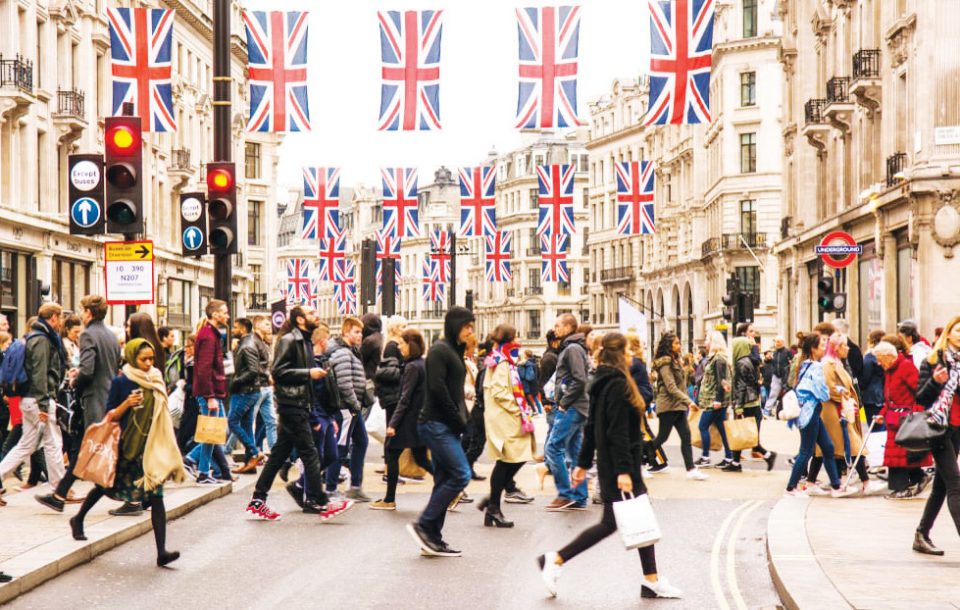High street footfall declines
ONLINE DRIVING SALES IN THE UK
A popular trend that has been seen in UK is that almost half of UK consumers intend to shop from domestic brands i.e around 43% and since the start of the pandemic, 55% of British households plan to increase their spend with local businesses.
One in ten British consumers have increased their purchases from local businesses due to the coronavirus.
51% % of British consumers have indicated they want to shop both in-store and online, as social distancing guidelines are still in place, 36% said they are more likely to choose the click and collect option.
High street shopping does not seem to be a popular choice among shoppers, as only 21% said they will go for gift shopping this year.
While 32% of shoppers are willing to leave physical stores this year to remain safe and avoid large crowds.
Consumers have indicated a desire to combine visiting the high street with shopping online this year, meaning connecting the online and offline experience will be key for the success of retailers.
ONLINE SHOPPING SPREE
Accessibility, curation, community and efficiency are one of the main reasons for increased sales at online channels.
For retailers to be successful they need to drive consumers to their own e-commerce environment, and retailers can leverage many of the marketplace aspects to do this via their publisher partners.
Amazon is a major source of gift inspiration for consumers as 48% use this during peak shopping.
Shoppers turned online to spend once more in August, driving the strongest UK retail sales growth for more than two years, the latest figures from the British Retail Consortium suggest.
Despite this, says the BRC, retail sales remain lower than they were before the pandemic, with store-based categories including clothing, footwear and beauty hit particularly hard.
Some 39.3% of UK retail sales took place over the internet last month, according to the BRC-KPMG Retail Sales Monitor for August.
That’s up from 29% a year earlier and illustrates the fast growth of online sales in recent months, both during and since the Covid-19 pandemic and lockdown.
Ecommerce increased its share of the retail market as online sales of non-food products grew by 42.4% in August.
Overall, retail sales grew by 3.9% in August in total compared to the same time last year – when they were down by 0.4% on the previous year.
Like-for-like sales, which excluded temporarily closed shops, rose by 4.7%, having fallen by 0.8% in the previous year.
Lockdown also appears to have permanently changed some consumers’ shopping habits, with online sales continuing to boom despite shop reopening in June.
“Many retailers are continuing to struggle, particularly those in clothing, footwear and beauty that are reliant on high footfall locations.
With rents accumulating, and the September quarter payment date fast approaching, many retailers are hanging on by a thread.
Unless businesses and government can successfully persuade office workers back into city and town centres, some high street retailers will be unable to afford their fixed costs.
Government will need to act fast or September will see more shops close and more job losses realised.”
Paul Martin, UK head of retail at KPMG, said: “We continue to experience mixed fortunes and not all retailers are where they should be at this point in the year.
Fashion sales did start to rebound somewhat – at least online – although this was mainly driven by children’s back-to-school purchases.
Social media recommendations have come second to marketplace buying this year with Facebook being the most dominant at 38 %, followed by Whatsapp at 35 %, Instagram at 31 % and YouTube at 27 %.
Clearly retailers have some serious thinking to do around what the future of the industry is going to be exactly.
While the overall online penetration rate has declined in recent months, the significant acceleration of the channel is here to stay.
With this in mind, retailers need to focus on the cost of doing business, as online is generally more expensive to operate.




